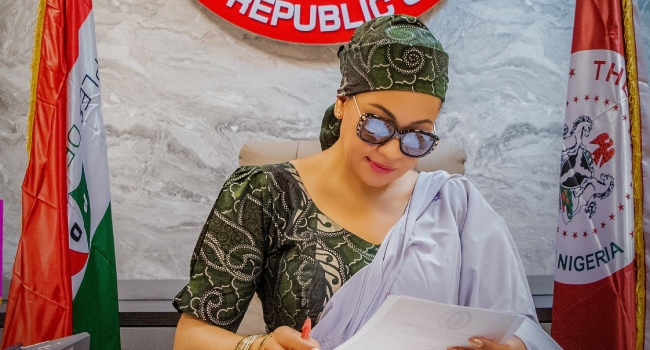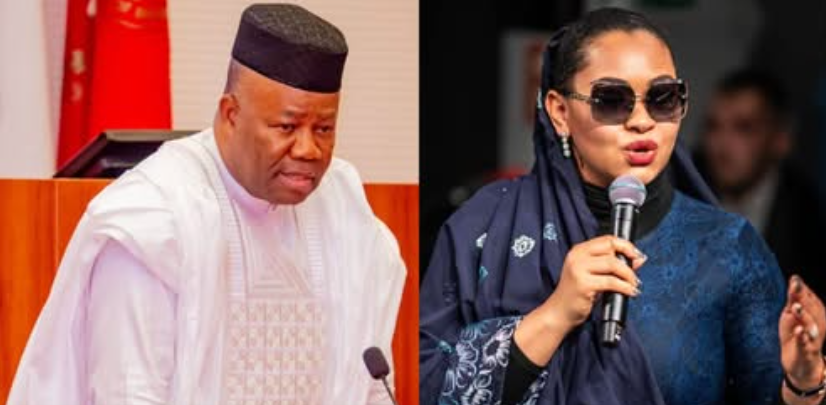Akpoti-Uduaghan Insists Court Ordered Her Recall, Rejects Senate Clerk’s Advisory Interpretation

Suspended Kogi Central lawmaker Senator Natasha Akpoti-Uduaghan has formally rejected the National Assembly’s claim that a July 4 Federal High Court judgment urging her return to the Senate was merely advisory. In a strongly worded July 14 “Rejoinder” to the Clerk of the National Assembly, her legal team—led by Michael Jonathan Numa, SAN—argued the court’s ruling is a binding directive requiring her immediate recall.
What Sparked the Dispute
Akpoti-Uduaghan was suspended for six months in March (formally enforced in early May 2025, according to Senate records citing “unparliamentary conduct” and “gross misconduct”). Critics have called the suspension politically motivated, alleging it targeted her over vocal interventions on budget and governance issues affecting Kogi Central.
She sued in FHC/ABJ/CS/384/2025, naming the Clerk of the National Assembly, the Senate, Senate President Godswill Akpabio, and the Senate Committee on Ethics chairman among the defendants.
The Court’s Decision
In a judgment delivered July 4, 2025, Justice B.F.N. Nyako faulted the length of the six‑month suspension, saying it deprived Akpoti-Uduaghan’s constituents of representation. The court’s enrolled orders, she says, begin with “It is hereby ordered…” and include 12 specific directives—one of which states the “Senate should recall the Plaintiff.”
While the word “should” was used, Akpoti-Uduaghan’s team contends that read in context, the structure and findings make the recall compulsory, not optional.
Senate Clerk Pushes Back
Responding in a July 14 letter, the Clerk (through Charles Yoila, Director of Litigation & Counselling) told her counsel that the court issued no mandatory order binding the Senate, describing the pronouncement as non-directive. The Clerk advised that the senator await Senate action should the chamber choose to exercise its power to recall her.
Senator’s Legal Counterargument
In her rejoinder, Akpoti-Uduaghan argued:
- The judgment language (“It is hereby ordered…”) conveys enforceable orders.
- Order 12 (“the Senate should recall the Plaintiff”) must be read as mandatory in light of preceding findings that the suspension was excessive and constitutionally flawed.
- Under Section 318 of the 1999 Constitution (as amended), a court “decision” includes an order or even a recommendation where tied to a judicial determination.
- Because the court found the suspension inconsistent with the Constitution (citing Section 63 in Order 10, according to her filing), Section 1(3) renders the offending action null to the extent of that inconsistency.
- Section 287(3) obliges the Senate to give effect to Federal High Court decisions. “Compliance…is not subject to further deliberation or discretion,” her team wrote.
Next Steps
With the National Assembly in recess following the death of former President Muhammadu Buhari, plenary is expected to resume July 22, 2025. Akpoti-Uduaghan has notified the Clerk of her intention to return that day, barring further obstruction.
Her lawyers warned that “all lawful measures” remain on the table should the Senate decline compliance.
Wider Political Undercurrents
Sources in the Red Chamber say senators are divided—some urging adherence to the court’s ruling (or at least a negotiated political settlement), others resisting on procedural or political grounds. Senator Seriake Dickson (Bayelsa West) recently urged a political solution in televised remarks.
Meanwhile, Senate President Godswill Akpabio has not issued a public statement on the matter.
Background Timeline
- March 4, 2025: Akpoti-Uduaghan obtains interim order (ex parte) from Justice Obiora Egwatu restraining Senate from disciplining her pending suit.
- March 5 / May 2025: Senate proceeds to suspend her (dates referenced differently in filings and commentary; enforcement confirmed in May).
- July 4, 2025: Justice B.F.N. Nyako rules suspension excessive; says Senate should recall her.
- July 11: Her counsel notifies Senate of intent to resume July 15.
- July 14: Senate Clerk replies—court order not mandatory. Same day, her legal team issues rejoinder insisting recall is binding.
- July 22 (expected): She plans to present herself when plenary reconvenes.
Why It Matters
The showdown tests judicial enforceability over internal legislative discipline and raises broader questions about representation rights, checks and balances, and politicized sanctions within Nigeria’s National Assembly. How the Senate resolves—or escalates—this case could shape future confrontations between lawmakers and the courts.



